
Cecil Blount DeMille was an American filmmaker and actor. Between 1914 and 1958, he made 70 features, both silent and sound films. He is acknowledged as a founding father of American cinema and the most commercially successful producer-director in film history. His films were distinguished by their epic scale and by his cinematic showmanship. His silent films included social dramas, comedies, Westerns, farces, morality plays, and historical pageants. He was an active Freemason and member of Prince of Orange Lodge #16 in New York City.
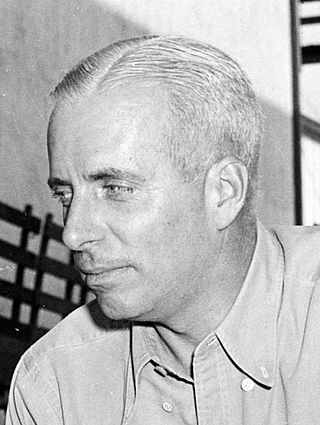
Howard Winchester Hawks was an American film director, producer, and screenwriter of the classic Hollywood era. Critic Leonard Maltin called him "the greatest American director who is not a household name." Roger Ebert called Hawks "one of the greatest American directors of pure movies, and a hero of auteur critics because he found his own laconic values in so many different kinds of genre material." He was nominated for the Academy Award for Best Director for Sergeant York (1941) and earned the Honorary Academy Award in 1974.
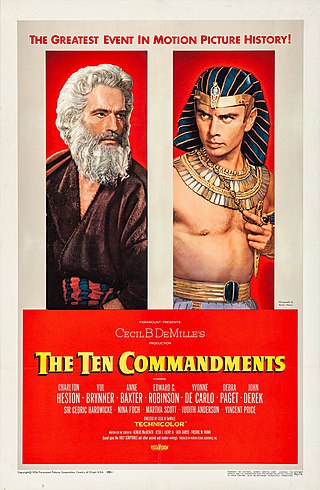
The Ten Commandments is a 1956 American epic religious drama film produced, directed, and narrated by Cecil B. DeMille, shot in VistaVision, and released by Paramount Pictures. The film is based on the 1949 novel Prince of Egypt by Dorothy Clarke Wilson, the 1859 novel Pillar of Fire by J. H. Ingraham, the 1937 novel On Eagle's Wings by A. E. Southon, and the Book of Exodus, found in the Bible. The Ten Commandments dramatizes the biblical story of the life of Moses, an adopted Egyptian prince who becomes the deliverer of his real brethren, the enslaved Hebrews, and thereafter leads the Exodus to Mount Sinai, where he receives, from God, the Ten Commandments. The film stars Charlton Heston in the lead role, Yul Brynner as Rameses, Anne Baxter as Nefretiri, Edward G. Robinson as Dathan, Yvonne De Carlo as Sephora, Debra Paget as Lilia, and John Derek as Joshua; and features Sir Cedric Hardwicke as Seti I, Nina Foch as Bithiah, Martha Scott as Yochabel, Judith Anderson as Memnet, and Vincent Price as Baka, among others.
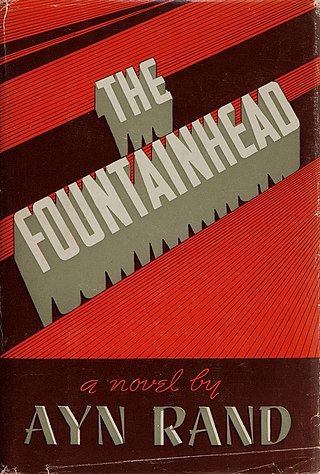
The Fountainhead is a 1943 novel by Russian-American author Ayn Rand, her first major literary success. The novel's protagonist, Howard Roark, is an intransigent young architect who battles against conventional standards and refuses to compromise with an architectural establishment unwilling to accept innovation. Roark embodies what Rand believed to be the ideal man, and his struggle reflects Rand's belief that individualism is superior to collectivism.

Hollywood and Vine, the intersection of Hollywood Boulevard and Vine Street in Hollywood, a district of Los Angeles, became known in the 1920s for its concentration of radio and movie-related businesses. The Hollywood Walk of Fame is centered on the intersection.

Samson and Delilah is a 1949 American romantic biblical drama film produced and directed by Cecil B. DeMille and released by Paramount Pictures. It depicts the biblical story of Samson, a strongman whose secret lies in his uncut hair, and his love for Delilah, the woman who seduces him, discovers his secret, and then betrays him to the Philistines. It stars Victor Mature and Hedy Lamarr in the title roles, George Sanders as the Saran, Angela Lansbury as Semadar, and Henry Wilcoxon as Prince Ahtur.

The King of Kings is a 1927 American silent epic film produced and directed by Cecil B. DeMille. It depicts the last weeks of Jesus before his crucifixion and stars H. B. Warner in the lead role.

William Churchill deMille, also spelled de Mille or De Mille, was an American screenwriter and film director from the silent film era through the early 1930s. He was also a noted playwright prior to moving into film. Once he was established in film he specialized in adapting Broadway plays into silent films.
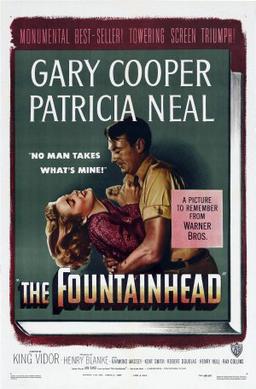
The Fountainhead is a 1949 American black-and-white drama film produced by Henry Blanke, directed by King Vidor, and starring Gary Cooper, Patricia Neal, Raymond Massey, Robert Douglas and Kent Smith. The film is based on the bestselling 1943 novel of the same name by Ayn Rand, who also wrote the screenplay adaptation. Although Rand's screenplay was used with minimal alterations, she later criticized the editing, production design and acting.

Abbie Jean MacPherson was an American silent actress, writer and director. She is known for her collaborations with directors D. W. Griffith and Cecil B. DeMille, and was a founding member of the Academy of Motion Picture Arts and Sciences.
Elliott J. Clawson was an American screenwriter. He wrote for more than 80 films between 1913 and 1929. He was born in Salt Lake City, Utah, and died in Vista, California. At the 2nd Academy Awards in 1930, four of his films were nominated for Best Writing: The Cop, Sal of Singapore, Skyscraper, and The Leatherneck.

Clara Beranger was an American screenwriter of the silent film era and a member of the original faculty of the USC School of Cinematic Arts.

The Hollywood Studio Club was a chaperoned dormitory, sometimes referred to as a sorority, for young women involved in the motion picture business from 1916 to 1975. Located in the heart of Hollywood, Los Angeles, California, the Studio Club was run by the YWCA and housed some 10,000 women during its 59-year existence. It was the home at various times to many Hollywood celebrities, including Marilyn Monroe, Ayn Rand, Donna Reed, Kim Novak, Maureen O'Sullivan, Rita Moreno, Barbara Eden, and Sharon Tate. The building was designed in the Italian Renaissance Revival architectural style by noted California architect Julia Morgan, who also designed Hearst Castle. The Studio Club closed in 1975, and the building was used as a YWCA-run Job Corps dormitory until April 30, 2012. It was listed in the National Register of Historic Places in 1979 and remains the property of the YWCA Greater Los Angeles.

Atlas Shrugged is a 1957 novel by Ayn Rand. It is her longest novel, the fourth and final one published during her lifetime, and the one she considered her magnum opus in the realm of fiction writing. She described the theme of Atlas Shrugged as "the role of man's mind in existence" and it includes elements of science fiction, mystery and romance. The book explores a number of philosophical themes from which Rand would subsequently develop Objectivism, including reason, property rights, individualism, libertarianism and capitalism, and depicts what Rand saw as the failures of governmental coercion. Of Rand's works of fiction, it contains Rand's most extensive statement of her philosophical system.

Ayn Rand: A Sense of Life is a 1996 American documentary film written, produced, and directed by Michael Paxton. Its focus is on novelist and philosopher Ayn Rand, the author of the bestselling novels The Fountainhead and Atlas Shrugged, who promoted her philosophy of Objectivism through her books, articles, speeches, and media appearances.
Red Pawn is a screenplay written by Ayn Rand. It was the first screenplay that Rand sold. Universal Pictures purchased it in 1932. Red Pawn features the theme of the evil of dictatorship, specifically of Soviet Russia.

Edward Bartlett Cormack was an American actor, playwright, screenwriter, and producer best known for his 1927 Broadway play The Racket, and for working with Howard Hughes and Cecil B. DeMille on several films.

Sada Louise Cowan (1882–1943) was an American writer who began her career as a playwright. She soon switched to writing feature films and is best known for her work on the films Don't Change Your Husband and Why Change Your Wife?. Cowan worked closely with director Cecil B. DeMille throughout her career.
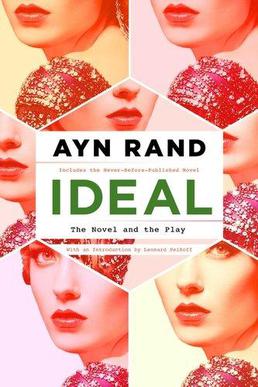
Ideal is a posthumously published 2015 novel by Ayn Rand.

The Unconquered is a three-act play written by Russian-American author Ayn Rand as an adaptation of her 1936 novel We the Living. The story follows Kira Argounova, a young woman living in the Soviet Union in the 1920s. Her lover Leo Kovalensky develops tuberculosis. To get money for his treatment, Kira has an affair with a Communist official, Andrei Taganov. After recovering from his illness, Leo becomes involved with black market food sales that Andrei is investigating. When Andrei realizes that Kira loves Leo, he helps his rival avoid prosecution, then commits suicide. Leo leaves Kira, who decides to risk her life escaping the country.


















